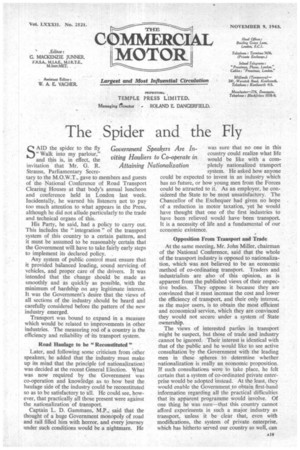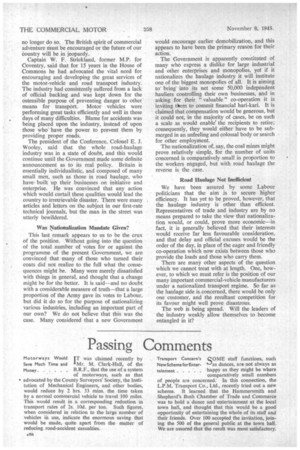The Spider and the Fly
Page 21

Page 22

If you've noticed an error in this article please click here to report it so we can fix it.
SAID the spider to the fly Government " Walk into my parldur," and this is, in effect, the Speakers Are Inviting Hauliers to Co-operate in invitation that Mr. G. R. Attaining Nationalization Strauss, Parliamentary Secre tary to the M,O.W.T., gave to members and guests of the National Conference of Road Transport Clearing Houses at that body's annual luncheon and conference held in London last week. Incidentally, he warned his listeners not to pay too much attention to what appears in the Press, although he did not allude particularly to the trade and technical organs of this.
His Party, he said, had a policy to carry out. This includes the " integration " of the transport system of this country to a certain pattern, and it must be assumed to be reasonably certain that the Government will have to take fairly early steps to implement its declared policy. .
Any system of public control must ensure that it provided balanced loading, sound servicing of vehicles, and proper care or the drivers. It was intended that the change should be made as smoothly and as quickly as possible, with the minimum of hardship on any legitimate interest. It was the Government's desire that the views of all sections of the industry should be heard and carefully considered before the pattern of the new industry emerged.
Transport was bound to expand in a measure which would be related to improvements in other industries. The measuring rod of a country is the efficiency and reliability of its transport system.
Road Haulage to be "Reconstituted " Later, and following some criticism from other speakers, he added that the industry must make up its mind that the principle (of nationalization) was decided at the recent General Election. What was now required by the Government was co-operation and knowledge, as to how best the haulage side of the industry could be reconstituted so as to be satisfactory to all. He could see, however, that practically all those present were against the nationalization of transport.
Captain L. D. Ga.mmans, M.P.; said that the thought of a huge Government monopoly of road and rail filled him with horror, and every journey under such conditions would be a nightmare. He was sure that no one in this country could realize what life would be like with a completely nationalized transport system. He asked how anyone could be expected to invest in an industry which has no future, or how young men from the Forces could be attracted to it. As an employer, he considered the State to be most unsatisfactory. The Chancellor of the Exchequer had given no hope of a reduction in motor taxation, yet he would have thought that one of the first industries to have been relieved would have been transport. It is a necessity of life and a fundamental of our economic existence.
Opposition From Transport and Trade • At the same meeting, Mr. John Miller, chairman of the National Conference, said that the whole • of the transport industry is opposed to nationaliza tion, which was not believed to be an economic • method of co-ordinating transport. Traders and industrialists are also of this opinion, as is apparent from the published views of their respective bodies. They oppose it because they are convinced that it must increase the cost and lower the efficiency of transport, and their only interest, as the major users, is to obtain the most efficient and economical service, which they are convinced they would not secure under a system of State ownership.
The views of interested parties in transport• might be suspect, but those of trade and industry cannot be ignored. Their interest is identical with that of the public and he would like to see active consultation by the Government with the leading men in these spheres to determine whether nationalization is really an economic proposition. If such consultations were to take place, he felt certain that a system of co-ordinated private enter prise would be adopted instead. At the least, they would enable the Government to obtain first-hand information regarding all the practical difficulties that its apparent programme would involve. Of one thing he was sure—that this country cannot afford experiments in such a major industry as transport, unless it he clear that, even with modifications, the system of private enterprise, which has hitherto served our country so well, can no longer do so. The British spirit of commercial adventure must be encouraged or the future of our eountry will be in jeopardy.
Captain W. F. Strickland, former M.P. for Coventry, said that for 15 years in the HOuse of Commons he had advocated the• vital need for encouraging and developing the great services of the motor-vehicle and road transport industry. The industry had consistently suffered from a lack of official backing and was kept down for the ostensible purpose of preventing danger to other means for transport. Motor vehicles were performing great tasks efficiently and well in these days of many difficulties. Blame for accidents was being placed upon the industry, instead of upon those who' have the power to prevent them by providing proper roads.
The president of the Conference, Colonel E. J. Wooley, said that the whole road-haulage industry was in a state of doubt, and this would continue until the Government made some definite announcement as to its real policy. Britain is essentially individualistic, and composed of many small men, such as those in road haulage, who have built up their businesses on initiative and enterprise. He was convinced that any action which would curtail these qualities would lead the country to irretrievable disaster. There were many articles and letters on the subject in our first-rate technical journals, but the man in the street was utterly bewildered.
Was Nationalization Mandate Given?
This last remark appears to us to be the crux of the position. Without going into the question of the total number of votes for or against the programme of the present Government, we are convinced that many of those who turned their coats did not realize to the full what the consequences might be. Many were merely dissatisfied with things in general, and thought that a change might be for the better. It is said—and no doubt with a considerable measure of truth—that a large proportion of the Army gave its votes to Labour, but did it do so for the purpose of nationalizing various industries, including an important part of our own? We do not believe that this was the case. Many considered that a new Government would encourage earlier demobilization, and this appears to have been the primary reason for their action.
The Government is apparently constituted of many who express a dislike for large industrial and other enterprises and monopolies, yet if it nationalizes the haulage industry it will institute one of the biggest monopolies of all. It is aiming to bring into its net some 50,000 independent hauliers controlling their own businesses, and in asking for their " valuable " co-operation it is inviting them to commit financial hari-kari. It is claimed that compensation would be generous, but it could not, in the majority of cases, be on such a scale as would enable' the recipients to retire; consequently, they would either have to be submerged in an unfeeling and colossal body or search for other employment.
The nationalization of, say, the coal mines might prove relatively simple, for the number of units concerned is comparatively small in proportion to the workers engaged, but with road haulage the reverse is the case.
Road Haulage Not Inefficient We have been assured by some Labour politicians that the aim is to secure higher efficiency. It has yet to be proved, however, that the haulage industry is other than efficient. Representatives of trade and industry are by no means prepared to take the view that nationalization would, or could, prove more economic—in fact, it is generally believed that their interests would receive far less favourable consideration, and that delay and official excuses would be the order of the day, in place of the eager and friendly co-operation which now exists between those who provide the loads and those who carry them.
There are manY other aspects of the question which we cannot treat with at length. One, however, to which we must refer is the position of our many important commercial-vehicle manufacturers under a nationalized transport regime. So far as the haulage side is-concerned, there would be only one customer, and the resultant competition for its favour might well prove disastrous.
The web is being spread. Will the leaders of the industry weakly allow themselves to become entangled in it?




























































